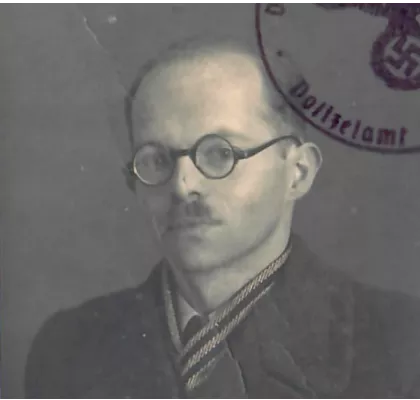Hanuš Hron (1925-2023)
The last Wulkower
- © Arbeitskreis Wulkow
Hanuš Hron was born on 18 June 1925 as Hanuš Weinstein in Most, Czech Republic. He and his sister had a happy childhood in pre-war Most, where his father worked as an ear, nose and throat specialist. "I come from a family that was referred to as 'three-day Jews' back then. We only went to synagogue three times a year, on Passover, Yom Kippur and Rosh Hashanah," he said, describing his family's religious practice.
According to his reports, being an avid Scout helped him to view later events in his life as adventures. "Until the second half of the 1930s, I didn't experience anti-Semitism very often, apart from the usual childhood teasing," he recalled. Afterwards, however, the German aggression towards Jews in Most slowly increased. "They marched at night with torches, sometimes stopping in front of our house. It was common knowledge that a Jewish doctor lived there. But nobody expected it to end the way it did".
After the occupation of the Sudetenland in the autumn of 1938, the family sought refuge in Prague. His parents rented a flat and he was able to go to school for a while. However, he was barred from attending a qualifying secondary school. He spent most of his free time playing team games and practising athletics at the Jewish sports club. After leaving school, he struggled to find an apprenticeship. He was briefly accepted as an apprentice in a plumbing company but was soon dismissed because of his Jewish background. He had similar experiences at other companies, forcing him to change jobs frequently, and even worked for a short time as an apprentice at a waterworks.
- © Centropa
Hanuš's father had been looking for a way for the family to leave the country since the Protectorate was proclaimed. This was a difficult endeavour, as most countries required high deposits or guarantees. In the end, he was given the opportunity to go to China as a doctor, but did not have enough money to take his family with him. In early 1941, he set off on his own, planning to bring his wife and children with him as soon as he was financially secure. "Most Jewish families didn't have this option," Hanuš explained. However, before his father could send for them, the family who had stayed behind (Hanuš, his mother and his sister) were deported to Theresienstadt.
In Theresienstadt, thanks to his apprenticeship at the waterworks, sixteen-year-old Hanuš worked as a pump and pipe repairman, a job that protected him and the rest of his family from deportation to "the East" and thus from extermination. In 1944, he volunteered for a transport of craftsmen to Germany. In Wulkow, a satellite camp of Theresienstadt in the woods 60 kilometres outside Berlin, they were to build alternative quarters for the Gestapo, who needed to move due to the bombing of Berlin. "As they could hardly prevent us from escaping, they promised us that our family members in Theresienstadt would be protected from further deportation to Poland while we were in Germany," he recalled. In his case, the promise was kept: In February 1945, he was reunited with his mother and sister in Theresienstadt. At that time, he suspected that the end of the war was near: in Wulkow, they had heard the rumbling of artillery from the Oder. In May 1945, Hanuš and his family were liberated in Theresienstadt.
His father returned from China in 1946. However, rebuilding their relationship after five years of separation proved to be quite difficult. During this time, Hanuš had become a member of the Communist Party and joined the Czechoslovak Youth Association. He began working at a pump manufacturer in Lutín near Olomouc and later, as an employee of the Youth Union at the Třinec ironworks. He even completed a distance learning degree. His stint as a communist activist was short-lived. Hanuš Hron described the re-emergence of anti-Semitism: "After the Rudolf Slánský trial, the Jews became the centre of attention again". At a party conference, he spoke out against a party resolution and was consequently expelled from the Communist Party and stripped of his offices. He spent the following years as an unskilled labourer in Ostrava and Most. In 1968, he assumed the position of a factory director in Nejdek, but lost the job again after the Warsaw Pact invasion in August 1968. He then worked in the manufacturing of vulcanising presses at the Chodos company in Chodov near Karlovy Vary until 1989.
Hanuš was married and very proud of his many children and grandchildren. He considered his large family as a late victory over the Nazis. He was always close to the former prisoners of Wulkow and regularly took part in reunions of the Wulkowers. He visited Wulkow, the site of the former camp in the forest, twice. Most recently, in the summer of 2021 as part of a memorial walk to Wulkow and a contemporary witness talk about the camp in nearby Trebnitz Castle. His stories about his time in Wulkow were an additional motivating factor in the creation of this website.
He died on 13 April 2023.

